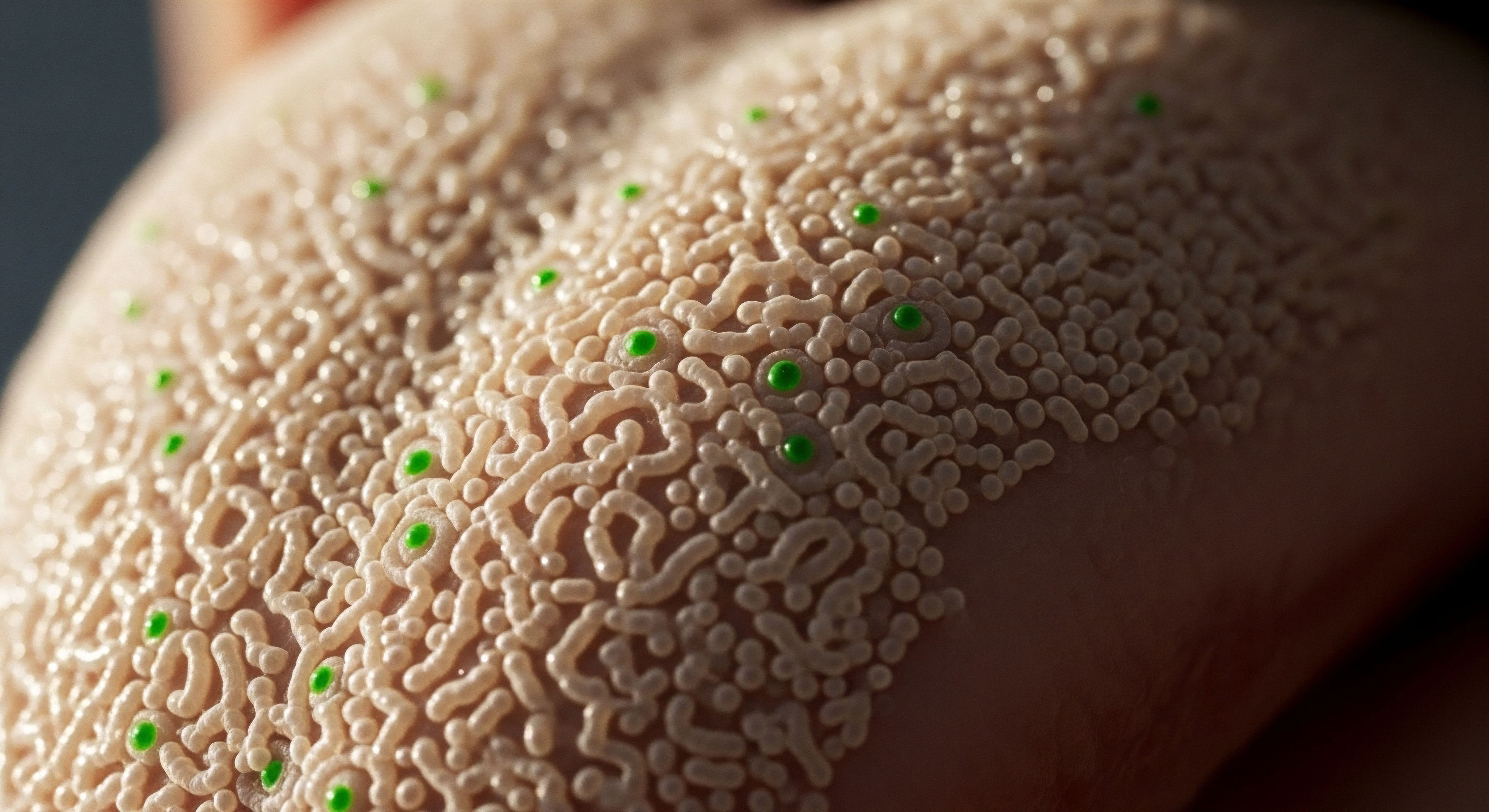

Your Unwritten Biological Future
The human experience arrives with an unspoken contract ∞ a default trajectory for our biology. We witness a gradual erosion of vigor, a subtle decline in cognitive sharpness, and a diminishing physical capacity. This perceived inevitability shapes expectations, leading many to accept a diminishing return on their biological investment. A fundamental misunderstanding exists regarding our inherent physiological adaptability. Our bodies possess an extraordinary capacity for self-regulation and restoration. Environmental pressures, modern lifestyles, and chronological passage frequently obscure this profound potential.
The internal systems, once robust and self-correcting, begin to drift. Hormonal balance, the very essence of youthful function, becomes a delicate equilibrium susceptible to myriad influences. Testosterone levels decline, growth hormone pulses diminish, and metabolic efficiency wanes. These shifts manifest as reduced drive, compromised recovery, and an accumulation of recalcitrant adipose tissue.
The markers on a blood panel tell a story of systemic fatigue, a quiet surrender to an outdated biological operating manual. We possess the means to rewrite that manual.
Data indicates a 1% to 2% annual decline in total testosterone levels in men after age 30, impacting energy, mood, and body composition.
Understanding the “why” begins with a clear assessment of biological reality. We acknowledge the complex interplay of endocrine signals, cellular communication, and genetic predispositions. This recognition forms the foundation for informed action. We recognize that vitality extends beyond the absence of disease; it embodies a state of peak function, resilience, and an unwavering presence.
The quest for biological mastery moves past merely mitigating symptoms. It targets the very mechanisms that dictate our lived experience, influencing every facet of physical and mental output.

The Erosion of Peak Function
Every system within the body communicates through intricate feedback loops. The hypothalamic-pituitary-gonadal (HPG) axis, a central regulator of sex hormones, illustrates this complexity. Environmental toxins, chronic stress, and poor nutritional choices disrupt these delicate signaling pathways. This disruption results in a cascade of downstream effects, impacting everything from muscle protein synthesis to neurocognitive speed. We witness the tangible consequences ∞ a slower thought process, persistent fatigue, and a reduced capacity for physical exertion.
Metabolic health stands as another critical pillar. Insulin sensitivity, glucose regulation, and mitochondrial function collectively determine our energy production and cellular longevity. Modern dietary patterns and sedentary habits often derail these processes. The body becomes less efficient at converting fuel into usable energy, leading to inflammation and cellular damage. This metabolic inefficiency represents a profound drag on overall vitality. We address these foundational imbalances directly, aiming to restore the body’s innate metabolic intelligence.


The Command over Your Chemistry
Biological recalibration demands a precise, scientific methodology. This involves a strategic intervention into the body’s core operating systems, using advanced protocols to restore optimal function. We move beyond generic wellness advice, implementing targeted therapies that address specific physiological needs. This approach recognizes each individual’s unique biochemical signature. The goal is to provide the body with the exact instructions and resources it requires to perform at its highest level.
Hormone optimization stands as a primary lever. For men, testosterone replacement therapy (TRT), administered judiciously and monitored rigorously, restores levels associated with peak cognitive function, lean body mass, and robust libido. For women, a tailored approach to bioidentical hormone replacement (BHRT) addresses declining estrogen, progesterone, and testosterone, supporting bone density, mood stability, and overall vitality. These are carefully calibrated interventions, reflecting a deep understanding of endocrine physiology.
Clinical studies show targeted peptide therapy can increase growth hormone secretion by up to 300% in some individuals, significantly impacting recovery and cellular repair.

Precision Peptides and Cellular Signaling
Peptide science offers another powerful avenue for biological enhancement. Peptides, short chains of amino acids, act as highly specific signaling molecules. They deliver precise instructions to cells, orchestrating a range of biological processes. Sermorelin, for instance, stimulates the pituitary gland to increase natural growth hormone secretion. BPC-157 accelerates tissue repair and reduces inflammation. Thymosin Beta-4 supports immune function and cellular regeneration. These agents represent a sophisticated means of directing the body’s innate healing and growth capabilities.
Our approach integrates these therapies within a comprehensive framework. This framework considers nutrition, exercise, sleep architecture, and stress mitigation. Each component reinforces the others, creating a synergistic effect. The interventions are designed to create a positive feedback loop, where improved hormonal balance supports better sleep, enhanced physical output, and superior recovery. This holistic perspective ensures sustained, long-term results. We approach the body as a high-performance system, capable of continuous refinement.

Strategic Interventions for Systemic Revival
A detailed diagnostic panel forms the initial step. This includes comprehensive hormone assays, metabolic markers, inflammatory indicators, and genetic insights. This data provides the precise coordinates for intervention. Based on this, a bespoke protocol is formulated. The process demands meticulous monitoring and regular adjustments, ensuring the body responds optimally. We fine-tune dosages and combinations, adapting to individual physiological responses.
- Comprehensive Endocrine Panel ∞ Assess testosterone, estrogen, thyroid, and adrenal function.
- Metabolic Health Markers ∞ Evaluate insulin sensitivity, glucose, and lipid profiles.
- Inflammatory Biomarkers ∞ Measure C-reactive protein and other indicators of systemic inflammation.
- Cellular Health Metrics ∞ Analyze mitochondrial function and oxidative stress markers.
- Advanced Genetic Insights ∞ Identify predispositions influencing nutrient metabolism and hormonal pathways.


The Continuum of Peak Existence
The question of “when” transcends chronological age. It pertains to a moment of conscious decision, a commitment to biological autonomy. Some initiate their recalibration journey in their late twenties or early thirties, seeking to preempt the subtle declines often observed. Others begin in their forties, fifties, or beyond, aiming to reclaim lost vitality and reverse age-associated changes. The opportune moment aligns with an individual’s desire to transcend conventional limitations and assert command over their health trajectory.
Consider the professional at the height of their career, facing increasing demands on cognitive function and physical endurance. A strategic biological intervention at this stage maintains their competitive edge. An athlete seeking accelerated recovery and injury prevention discovers significant advantages through targeted peptide protocols. A parent desiring sustained energy and mental clarity to fully engage with their family finds profound benefits. The “when” aligns with ambition and a refusal to settle for anything less than optimal.
Early intervention with targeted therapies can preserve up to 70% more muscle mass and bone density compared to reactive treatments initiated years later.

Proactive Strategies, Enduring Returns
This approach stands as a proactive investment in long-term health and performance. It contrasts sharply with reactive medicine, which addresses disease after its manifestation. Bio-recalibration aims to prevent the onset of decline, maintaining physiological reserves. The benefits extend far beyond immediate symptomatic relief. Individuals experience sustained energy, improved body composition, enhanced cognitive acuity, and a heightened sense of well-being. The initial commitment yields enduring returns, compounding over years.
The journey unfolds over distinct phases. An initial stabilization period addresses acute imbalances. This leads to a phase of optimization, where fine-tuning protocols elevate function to peak levels. Maintenance protocols then preserve these gains, adapting to life’s ongoing demands. Each phase builds upon the last, creating a resilient, high-performing biological system. This iterative process ensures continuous adaptation and refinement, aligning the body with evolving goals.

Life’s Milestones, Biological Reinforcement
Major life transitions frequently serve as catalysts for seeking biological recalibration. Periods of high stress, significant career changes, or personal challenges underscore the importance of robust physiological reserves. These moments present opportunities to reinforce the body’s internal systems, ensuring resilience. Rather than passively enduring these periods, individuals can actively fortify their biology, turning potential stressors into platforms for growth. The commitment to peak performance transforms life’s challenges into opportunities for greater strength.

The Sovereign Self Awakens
We stand at the precipice of a new biological era. The passive acceptance of decline recedes, replaced by an active, intelligent pursuit of human potential. Bio-recalibration represents a fundamental shift in our relationship with our own biology. It embodies a commitment to the highest expression of self, a deliberate choice to engineer a life of sustained vitality and performance.
This is not a fleeting trend. It is the logical progression of human ambition, driven by science and refined by experience.
My work, and indeed my life’s mission, centers on empowering individuals to claim this biological sovereignty. We possess the tools, the knowledge, and the scientific backing to move beyond default settings. The future of human health is a landscape of active design, where individuals shape their physiology with precision and purpose.
The era of biological mastery has arrived. The decision rests with each individual to step into this redefined future, commanding their chemistry, and living at the zenith of their potential.



